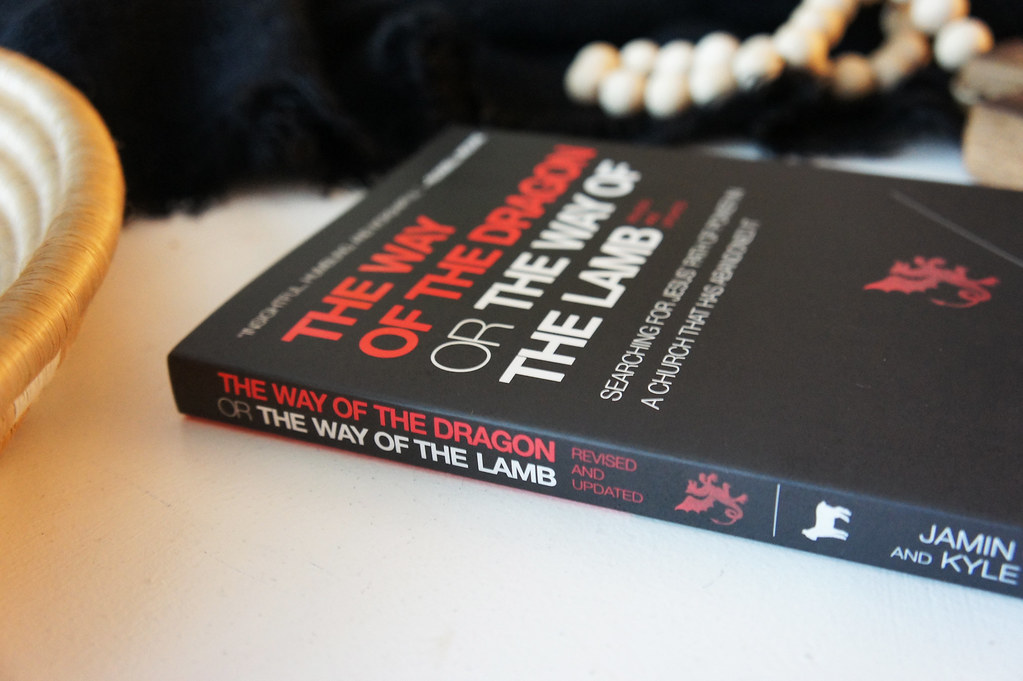Over the past few years Jamin Goggin and Kyle Strobel have become dear friends. They are my brothers in Christ, who share with me a deep belief that the Christian life is a cruciform life. This shared conviction is what drove me to join them, not long before the pandemic began, at a conference they were hosting in southern California called The Way of the Lamb. The conference was designed to be a space for pastors and ministry leaders to honestly confess their temptations with power – where they could prayerfully encounter God in their weakness. The initial impetus for this event was a book that Jamin and Kyle had published: The Way of the Dragon or the Way of the Lamb. They have recently released a new edition of the book and I am now more than ever convinced of the importance of this message — and cannot recommend this book and it’s life-changing truth highly enough to you…
guest post by Jamin Goggin and Kyle Strobel
Several years ago, I (Jamin) had the joy of vacationing in Greece. The drive from Athens to Corinth took about an hour. The drive is so beautiful you almost forget about your destination.
The brilliant blue water of the Aegean Sea is visible nearly the entire way. The city of Corinth is strategically positioned as a byway from the Aegean Sea to the Ionian Sea, as well as from mainland Greece to the Peloponnese.
“What does Christian power really look like?”
As you arrive and see the ruins, it is easy to imagine how glorious this city must have been in the first century. When Julius Caesar reconstituted Corinth a century after its destruction in 146 BC, the city was repopulated with a large contingency of Roman freedmen (former slaves) along with Greeks, Jews, and others.
The Corinth that Paul visited in AD 50 was a cultural and economic hub with no solidified aristocracy, resulting in an open society with an unusual degree of freedom for upward mobility. This created an incredibly competitive environment. If you worked hard enough and were shrewd enough, you could ascend the ladder of status and power.
Once at the top, you were justified in boasting of such an accomplishment. As Tim Savage tells us, “In Corinth, perhaps more than anywhere else, social ascent was the goal, boasting and self-display the means, personal power and glory the reward.” The city’s social landscape mirrored the competitive spirit of its famed Isthmian games.
When Paul first preached the gospel in Corinth he had success (Acts 18), but subsequently the Corinthians began to question Paul’s authority as an apostle. They wanted proof that Christ was speaking through Paul (2 Cor. 13:3).
The Corinthians were wrestling with the same question that Kyle and I were: What does Christian power really look like? More specifically in relationship to Paul was the question of what apostolic power ought to look like.













The question had already caused a divide over which apostle/ teacher Corinthian Christians thought was the most special—Paul, Apollos, Peter, or Jesus himself (1 Cor. 1:10–17). This question was at the heart of the tension between Paul and the “super-apostles” who had come into town challenging Paul’s authority and vying for power (2 Cor. 11:5).
“The problem confronting Paul was that he did not embody any of the marks of power the Corinthians valued.”
The problem confronting Paul was that he did not embody any of the marks of power the Corinthians valued.
In many ways, he was the exact opposite of what they desired: He did not have an impressive physical presence, he lacked bravado and confidence, and he was meek and gentle in his leadership (2 Cor. 10:10). He did not speak with eloquence (2 Cor. 11:6), and he did not boast in money, intentionally refusing to take money for his “services,” choosing to work a menial job that would have been socially dishonorable (2 Cor. 11:7).
On top of all this, Paul experienced continual suffering and hardship (2 Cor. 11:21–30). Each of these things was a sign of weakness in the eyes of the Corinthians.
The totality of Paul’s weaknesses had become unpalatable to them. The Corinthians wanted a super-apostle, not an apostle of weakness.
In the face of the Corinthians’ critique of and open opposition to his authority, we might expect Paul to have marshalled a persuasive defense, silencing the Corinthians with an overwhelming display of his authority as an apostle of Christ.
Or, at the very least, we might expect him to have hidden the weaknesses that were cause for criticism.
He faced the potential of losing the Corinthian believers to a false gospel (2 Cor. 11:1–6), and the stability of the church at Corinth largely rested on how Paul would respond to the critiques of his apostolic authority.
Rather than meeting the Corinthians’ expectations, however, Paul shone a light on the very weaknesses that caused him criticism, putting his weakness front and center (2 Cor. 1:3–7; 6:2–10; 11:16–12:10).
Radically, Paul embraced the very things that the Corinthians rejected, identifying these weaknesses as signs of his true apostleship.
“Radically, Paul embraced the very things that the Corinthians rejected, identifying these weaknesses as signs of his true apostleship.”
He argued that his weakness was actually verification of the power of God working through him, and he rejected the Corinthian view of power as worldly success, bravado, and status.
For Paul, the power to dominate and win was antithetical to the nature of the gospel.
This is not merely a question of what leadership “style” you like, but a question of whether you embrace the way of Jesus.
The high point of Paul’s defiant response to the Corinthians’ lust for power is found in the passage we began with: “‘My grace is sufficient for you, for my power is made perfect in weakness.’ Therefore I will boast all the more gladly of my weaknesses, so that the power of Christ may rest upon me. For the sake of Christ, then, I am content with weaknesses, insults, hardships, persecutions, and calamities. For when I am weak, then I am strong” (2 Cor. 12:9–10).
For a culture so fixated on power, it is hard to imagine how paradigm-shifting these words were, and how difficult they would have been to hear. But, of course, our own cultural context mirrors the Corinthian context in nearly every way.
In a culture boasting of personal accomplishment and success, Paul’s response was to boast in his weakness.
Why did he do so? So that the power of Christ may rest upon him.
Paul viewed an embrace of weakness as an embrace of strength, because in weakness he could depend upon the might of God. His weakness was the source of his power.
“Paul viewed an embrace of weakness as an embrace of strength, because in weakness he could depend upon the might of God. His weakness was the source of his power.”
Paul did not anchor his life as a follower of Jesus in his ability, talent, gifting, resume, or strength, but in the grace of God alone.
To marshal these skills or achievements in his flesh would have been to embrace power from below and thus reject the gospel. Paul wrote, “For Christ did not send me to baptize but to preach the gospel, and not with words of eloquent wisdom, lest the cross of Christ be emptied of its power” (1 Cor. 1:17).
Incredibly, Paul argued that to embrace the Corinthian way—to put ourselves forward, emphasizing our strengths and seeking our own power—was to empty the cross of its power.
The way of life to which followers of Jesus are called entails discovering that power is found in weakness.
This way of power found in weakness is not original to Paul, but is a sign that Paul has followed Christ faithfully.
Embrace of our weakness is patterned after the way of Christ, who took up his cross, wholly dependent upon the Father for life and strength.
Just as Jesus found his life in the Father by the Spirit, so now do we. We are those who gain our lives only when we lose them for Christ’s sake (Matt. 16:25).
We are called not to rely upon ourselves, “but on God who raises the dead” (2 Cor. 1:9).
Power in the Christian life is found in one place and one place alone. It is God’s energy at work within that we must come to embrace.
Power is found in dependence upon God in light of our weakness.
Jamin and his wife live in Escondido, California with their four children where Jamin pastors, and Kyle and his wife live in Fullerton, California with their two kids where Kyle is a professor at Biola University.
Jamin and Kyle have recently released the second edition of their book, The Way of the Dragon or the Way of the Lamb: Searching for Jesus’ Path of Power in a Church that Has Abandoned It. In it they wrestle through their own temptations with worldly power, and turn our attention to Jesus’ subversive way of power found in weakness. This second edition also includes a new chapter in which Jamin and Kyle reflect on their own experience of being betrayed by a leader who abused his power.
One of the truly unique features of this book are the conversations Jamin and Kyle invite the readers into. They travel around the world, seeking out great sages of the faith who have modeled Jesus’ way of power. As readers eavesdrop on the authors’ conversations with people such as J. I. Packer, Marva Dawn, John Perkins, James Houston, Dallas Willard, and Eugene Peterson, they begin to piece together the new-old reality of following Jesus today. The Way of the Dragon or the Way of the Lamb offers a compelling MUST READ vision of the way of Jesus that will challenge both individual believers and the church as a whole. Truly: an UNFORGETTABLE book.








